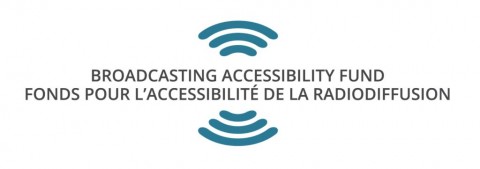
OTTAWA — The Broadcasting Accessibility Fund will award $744,479 in grants to six new projects designed to advance accessibility to broadcasting content for Canadians with disabilities.
These six projects represent the completion of the Fund’s fifth round of grants, with approximately $3.3 million committed to date through five rounds of funding, to address gaps in broadcasting accessibility.
The projects approved by the Board of Directors are:
- Understanding User Experiences of Play-by-Play Captioning in Fast-Paced Live Sports — Canadian Association of the Deaf — $191,570: Fast paced live sports (such as hockey) continues to be one of the most difficult genres of programming to accurately caption with minimal loss of information. The primary objective of the project is to better understand how the presence and nature of play-by-play captioning of fast-paced live sports programming contributes to or detracts from the user experience and satisfaction of live sports programs. This project builds upon recently completed work undertaken by the Captioning Consumers Advocacy Alliance (a project that received a grant from the Fund in 2016 during the second round of projects).
- French-language Video and Video Description — CRIM — $137,894: The objective of this project is to bring a machine learning method known as Deep Learning to the automatic production of French-language Described Video (DV). The project would compile a French-language video description dataset and compare it with the dataset already produced in English. The objective of the project is to compile a set of annotated French-language videos called VVD (video and video description). Currently, this type of machine learning for DV has only been available in English, and expanding into French language content would greatly improve accessibility for Francophone audiences and would potentially improve the quality of DV while reducing the cost for broadcasters.
- Accessibility as Aesthetic in Broadcast Media: Three Disability-Led Films — Humber College — $131,481: Three fully accessible films led by filmmakers with disabilities will inform the Canadian broadcasting industry of the importance and value of inclusive design. The project will make inclusion more appealing to broadcast media producers, in that the films will serve to advocate for people with disabilities through the stories and perspectives revealed. The project stems from the Making Accessible Media course that originally received a grant from the Fund in the second round of funding, and became a permanent part of Humber’s course offerings in the School of Media Studies and Information Technology.
- NAIT Captioning and Court Reporting Diploma Online — NAIT — $100,000: The NAIT Captioning and Court Reporting Project will convert the existing diploma program to an online format, to deliver a web-based curriculum training in English-language steno captioning. Transitioning to an online format will increase the number of students able to enroll in the Captioning and Court Reporting Program, and will result in greater captioning support for the broadcasting industry.
- Providing transcription for Radio-Canada audio content: a forward-looking project for Francophone Canadians living with hearing impairments — Radio Canada — $103,550: A functional prototype will be developed for generating automated transcripts for audio programming, specifically targeting content accessibility for deaf and hard of hearing audience members. A key focus will be to find solutions to the challenges of transcribing audio into French text, and integrate audio transcripts into the production flow of radio programming. The trial program for transcription will be Aujourd’hui l’histoire (Today in History), a half-hour series that runs Monday to Thursday on Radio-Canada’s main radio network ICI Première. The project would complement previous automated transcription work completed by CBC’s English-language Radio One (projects that received grants from the Fund during the first and second rounds of funding).
- Development of a method of automatic closed captioning quality subjective assessment using an AI Technology — Ryerson University — $79,984: Development of an artificial intelligence system that accomplishes two tasks: to automate the process of assessing the quality of live closed captioning by consumers, and to reflect the perspectives of deaf and hard of hearing consumers of captioning. The project will develop a model of viewer decisions based on errors detected, across a number of genres of programming content. This system will allow broadcasters access to a cost-effective way to include the perspectives of deaf and hard of hearing audiences in the assessment of captioning quality, as a complement to human assessment.
“I’m very excited about these outstanding initiatives,” said Board of Directors chair Marcia Yale, in a news release. “These six projects fully meet our mandate and objectives, and continue to represent the types of projects we’ll be looking for in future calls for funding applications. All are characterized by partnerships, transparency and broad dissemination of results, which are key elements of the Fund’s grant program.”
The Fund’s next call for Letters of Intent, the first step in the application process, will be issued in February 2020.
Created as part of the tangible benefits package associated with Bell Canada’s acquisition of CTV, the Broadcasting Accessibility Fund is an independent and impartial funding body that supports innovative projects to increase the accessibility of broadcasting content in Canada.



